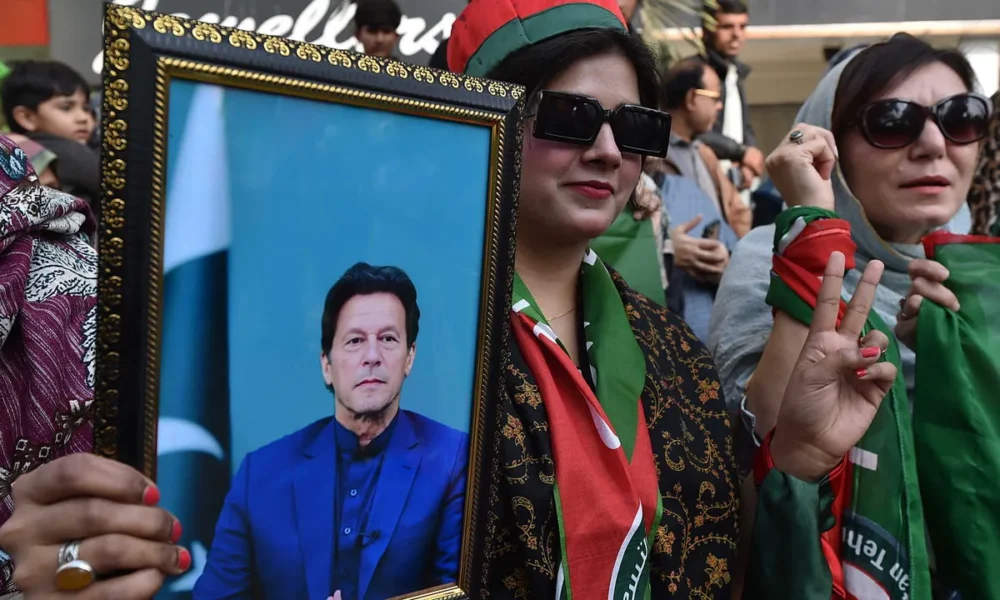Pakistan goes to the polls this week and former cricket star-turned politician Imran Khan looms large. But the same forces that ousted him from power last year are at work again to keep his party out of office but the people vote to Imran Khan and the Election in Pakistan not fair any point.
Imran Khan and the Election in Pakistan: Pakistan goes to the polls this week and former cricket star-turned politician Imran Khan looms large. But the same forces that ousted him from power last year are at work again to keep his party out of office.
Two damning court verdicts in one week (a ten-year sentence for leaking state secrets and 14 years for corruption involving state gifts) have made that clear.
Why Doesn’t the U.S. Seem to Care?
Imran Khan and the Election in Pakistan: As Pakistan prepares to vote on February 8, one of the country’s most powerful political figures is locked away, barred from running in the elections and under a cloud of repression that many say has been engineered to keep him out. The ex-premier, Imran Khan, was sentenced to 10 years in prison Tuesday in a “cypher case” after being found guilty of divulging state secrets.
Khan rose to prominence in the early 2000s by campaigning against corruption and advocating for social justice, which galvanized millions of Pakistanis who were fed up with the ruling elites. But critics accuse him of pursuing populist policies that often clash with the military’s interests.
Imran Khan and the Election in Pakistan: The army is the ultimate arbiter of politics in the nuclear-armed country, a power that it wields with impunity, even against its own former proteges. When Khan fell out with the military establishment in 2021, that seemed to be the end of his political career.
But the military reacted with a vengeance, and since then has used every tool at its disposal to keep Khan from advancing in politics. In addition to the prison sentences, he has been banned from using his party’s cricket bat symbol on the ballot paper, which allows the millions of illiterate voters to pick out their preferred candidate without needing to read names.
Imran Khan and the Election in Pakistan: Moreover, his party has been banned from entering sensitive areas where violence is common, and several members of the PTI have died in attacks that have targeted them.
Yet, in spite of his setbacks, Khan remains a potent force, with supporters who see him as a champion for the poor. He has made strong promises to tackle economic issues and to fight corruption, and his popularity has not waned even from behind bars. But with a weakened army and other state institutions waging a war of attrition against him, it seems unlikely that he can mount any significant challenge in the election. He will have to contend with widespread allegations of pre-poll rigging.
Are Pakistan? Elections Brazenly Rigged?
Imran Khan and the Election in Pakistan: Pakistan has huge economic, foreign policy and security failures that stem from political illegitimacy and widespread election rigging. The country, which has been in a state of political chaos since its independence, is currently experiencing a period of unprecedented instability. The military establishment, which is in charge of elections and the political process, is using every tool at its disposal to ensure its preferred candidate wins.
Widespread allegations that the army is manipulating Thursday’s elections in favor of former cricket star-turned-politician Imran Khan are threatening to tarnish what will be only the second democratic transition of power in the country’s 70-year history.
Imran Khan and the Election in Pakistan: Although his record as a politician is checkered, Khan remains popular with many Pakistanis. He is seen as standing up to a class of entrenched and feckless elites who are the architects of a status quo that is abhorred by most Pakistanis. His party, despite the myriad legal hurdles that are obstructing it from participating fully in the election, is fighting to secure as many votes as possible.
There are many factors contributing to this growing tension, including a series of terrorist attacks that have targeted Pakistanis and foreigners, as well as the military’s decision to block all non-residents from leaving the country. This, along with rising inflation that has led to a loss in purchasing power for the general population, is causing public discontent.
Imran Khan and the Election in Pakistan: The military has responded to this growing anger by waging a campaign of intimidation against Khan and his followers. His family has been subjected to threats, and his supporters have been attacked and even killed in what some say are targeted assassinations. The military is also restricting the flow of money into the party, which is leading to defections by some senior members.
While there was undoubted manipulation in the run-up to the last parliamentary election in 2018, the situation has gone from bad to worse this time, and there is no sign of fair competition on the horizon. In fact, Mehmood says the army is so determined to keep its preferred candidate in power that it has asked the Lahore-based television channel he works for not to show any PTI candidates or their symbols during campaigning.
Is the U.S. Helping?
Imran Khan and the Election in Pakistan: Whether the election on February 8 will be free and fair remains to be seen. But a credible outcome would be a much-needed breath of fresh air for Pakistan? 230 million citizens, who are facing growing poverty, inflation and unemployment. They are also in the midst of a severe security crisis, with militants making frequent strikes on the country? police and military.
Khan, the former cricket hero, is a popular figure who is seen as standing against a class of entrenched and feckless elites. But his Pakistan Tehreek-e-Insaf party faces numerous legal hurdles preventing it from fully participating in the vote. The latest blow came this week, when a court sentenced him to 14 years in prison for corruption charges related to selling state gifts while in office.
Imran Khan and the Election in Pakistan: The case against him is just the latest in a series of legal troubles that have dogged the ex-prime minister since his removal from power last year, when he blamed the military for the move. His supporters responded by going on destructive rampages, wrecking army buildings and other property. In the wake of the chaos, the army cracked down on Khan and his followers, arresting many and imposing draconian new rules that include military trials for civilians.
This crackdown has helped blunt the popularity of his party, but many of his backers remain convinced that the elections will be rigged. A recent Gallup poll found that nearly seven out of 10 Pakistanis lack confidence in the honesty of their elections. Close to 90 percent believe that corruption is rife in their government.
Imran Khan and the Election in Pakistan: Despite the widespread crackdown, analysts say that there is still only one clear frontrunner in the race for prime minister: Nawaz Sharif, a three-time former premier who has returned to Pakistan after ending years of self-imposed exile in London to avoid prison sentences on corruption convictions. He is seeking a fourth term as leader but has been challenged by a younger rival, Bilawal Bhutto Zardari, the son of slain former Prime Minister Benazir Bhutto and a political novice. Both have been campaigning aggressively, but have faced a barrage of attacks on their opponents and their supporters.
What Can the U.S. Do?
This week, Pakistan holds national elections to elect members of parliament and, from those, the next prime minister. The fifth-most populous country in the world, and a major nuclear power, it faces daunting challenges including economic growth, tackling security threats and stemming illegal migration. For the United States and many other countries, a strong and stable Pakistan is an important ally.
Imran Khan and the Election in Pakistan: But a free and fair election could prove elusive for the country. Pakistan has a history of ballot-stuffing, vote intimidation and other forms of electoral fraud that leave voters disillusioned. And the security establishment, long known for controlling Pakistani politics, appears determined to prevent Khan and his political movement, the Pakistan Tehreek-e-Insaf (PTI), from returning to power.
The military has targeted PTI leaders with several cases alleging corruption, fomenting insurrection and misusing state secrets. The army top brass has also banned PTI from using its cricket bat symbol on campaigning materials, which has hampered the party? efforts to spread its message. Nevertheless, the party has an energized grassroots base that supports its anti-military rhetoric.
Imran Khan and the Election in Pakistan: But for some voters, the multiple convictions of Khan and his colleagues — the latest, on Saturday, was a seven-year sentence for a family case against him and his wife — have reinforced the impression that this election is already fixed. They believe the military will ensure Khan is out of the picture and Sharif is back as the establishment? preferred candidate.
That perception may hurt the economy, especially if a large share of voters believe they have been robbed by the elections, says Samina Yasmeen, an associate professor at the University of Western Australia and co-author of a study on Pakistan? democracy. “If people see this as an unfree and unfair process, they won’t trust any government,” she said.
Imran Khan and the Election in Pakistan: Moreover, a distrust of the electoral process could discourage young people from participating in the elections. That would be a loss for Pakistan, which has a large youth population that represents the future of its society and economy. And it could exacerbate the divide that already exists between rural and urban populations, the educated and the poor.
Two damning court verdicts in one week (a ten-year sentence for leaking state secrets and 14 years for corruption involving state gifts) have made that clear.
Why Doesn’t the U.S. Seem to Care?
Imran Khan and the Election in Pakistan: As Pakistan prepares to vote on February 8, one of the country’s most powerful political figures is locked away, barred from running in the elections and under a cloud of repression that many say has been engineered to keep him out. The ex-premier, Imran Khan, was sentenced to 10 years in prison Tuesday in a “cypher case” after being found guilty of divulging state secrets.
Khan rose to prominence in the early 2000s by campaigning against corruption and advocating for social justice, which galvanized millions of Pakistanis who were fed up with the ruling elites. But critics accuse him of pursuing populist policies that often clash with the military’s interests.
Imran Khan and the Election in Pakistan: The army is the ultimate arbiter of politics in the nuclear-armed country, a power that it wields with impunity, even against its own former proteges. When Khan fell out with the military establishment in 2021, that seemed to be the end of his political career.
But the military reacted with a vengeance, and since then has used every tool at its disposal to keep Khan from advancing in politics. In addition to the prison sentences, he has been banned from using his party’s cricket bat symbol on the ballot paper, which allows the millions of illiterate voters to pick out their preferred candidate without needing to read names.
Imran Khan and the Election in Pakistan: Moreover, his party has been banned from entering sensitive areas where violence is common, and several members of the PTI have died in attacks that have targeted them.
Yet, in spite of his setbacks, Khan remains a potent force, with supporters who see him as a champion for the poor. He has made strong promises to tackle economic issues and to fight corruption, and his popularity has not waned even from behind bars. But with a weakened army and other state institutions waging a war of attrition against him, it seems unlikely that he can mount any significant challenge in the election. He will have to contend with widespread allegations of pre-poll rigging.
Are Pakistan’s? Elections Brazenly Rigged?
Imran Khan and the Election in Pakistan: Pakistan has huge economic, foreign policy and security failures that stem from political illegitimacy and widespread election rigging. The country, which has been in a state of political chaos since its independence, is currently experiencing a period of unprecedented instability. The military establishment, which is in charge of elections and the political process, is using every tool at its disposal to ensure its preferred candidate wins.
Widespread allegations that the army is manipulating Thursday’s elections in favor of former cricket star-turned-politician Imran Khan are threatening to tarnish what will be only the second democratic transition of power in the country’s 70-year history.
Although his record as a politician is checkered, Khan remains popular with many Pakistanis. He is seen as standing up to a class of entrenched and feckless elites who are the architects of a status quo that is abhorred by most Pakistanis. His party, despite the myriad legal hurdles that are obstructing it from participating fully in the election, is fighting to secure as many votes as possible.
Imran Khan and the Election in Pakistan: There are many factors contributing to this growing tension, including a series of terrorist attacks that have targeted Pakistanis and foreigners, as well as the military’s decision to block all non-residents from leaving the country. This, along with rising inflation that has led to a loss in purchasing power for the general population, is causing public discontent.
The military has responded to this growing anger by waging a campaign of intimidation against Khan and his followers. His family has been subjected to threats, and his supporters have been attacked and even killed in what some say are targeted assassinations. The military is also restricting the flow of money into the party, which is leading to defections by some senior members.
Imran Khan and the Election in Pakistan: While there was undoubted manipulation in the run-up to the last parliamentary election in 2018, the situation has gone from bad to worse this time, and there is no sign of fair competition on the horizon. In fact, Mehmood says the army is so determined to keep its preferred candidate in power that it has asked the Lahore-based television channel he works for not to show any PTI candidates or their symbols during campaigning. Imran Khan and the Election in Pakistan.
Is the U.S. Helping?
Whether the election on February 8 will be free and fair remains to be seen. But a credible outcome would be a much-needed breath of fresh air for Pakistan? 230 million citizens, who are facing growing poverty, inflation and unemployment. Imran Khan and the Election in Pakistan, They are also in the midst of a severe security crisis, with militants making frequent strikes on the country’s police and military.
Imran Khan and the Election in Pakistan, the former cricket hero, is a popular figure who is seen as standing against a class of entrenched and feckless elites. But his Pakistan Tehreek-e-Insaf party faces numerous legal hurdles preventing it from fully participating in the vote. The latest blow came this week, when a court sentenced him to 14 years in prison for corruption charges related to selling state gifts while in office. Imran Khan and the Election in Pakistan.
The case against him is just the latest in a series of legal troubles that have dogged the ex-prime minister since his removal from power last year, when he blamed the military for the move. Imran Khan and the Election in Pakistan, His supporters responded by going on destructive rampages, wrecking army buildings and other property. In the wake of the chaos, the army cracked down on Khan and his followers, arresting many and imposing draconian new rules that include military trials for civilians.
Imran Khan and the Election in Pakistan: This crackdown has helped blunt the popularity of his party, but many of his backers remain convinced that the elections will be rigged. A recent Gallup poll found that nearly seven out of 10 Pakistanis lack confidence in the honesty of their elections. Close to 90 percent believe that corruption is rife in their government.
Despite the widespread crackdown, analysts say that there is still only one clear frontrunner in the race for prime minister: Nawaz Sharif, a three-time former premier who has returned to Pakistan after ending years of self-imposed exile in London to avoid prison sentences on corruption convictions. He is seeking a fourth term as leader but has been challenged by a younger rival, Bilawal Bhutto Zardari, the son of slain former Prime Minister Benazir Bhutto and a political novice. Both have been campaigning aggressively, but have faced a barrage of attacks on their opponents and their supporters.
What Can the U.S. Do?
Imran Khan and the Election in Pakistan: This week, Pakistan holds national elections to elect members of parliament and, from those, the next prime minister. The fifth-most populous country in the world, and a major nuclear power, it faces daunting challenges including economic growth, tackling security threats and stemming illegal migration. For the United States and many other countries, a strong and stable Pakistan is an important ally.
But a free and fair election could prove elusive for the country. Pakistan has a history of ballot-stuffing, vote intimidation and other forms of electoral fraud that leave voters disillusioned. And the security establishment, long known for controlling Pakistani politics, appears determined to prevent Khan and his political movement, the Pakistan Tehreek-e-Insaf (PTI), from returning to power.
Imran Khan and the Election in Pakistan: The military has targeted PTI leaders with several cases alleging corruption, fomenting insurrection and misusing state secrets. The army top brass has also banned PTI from using its cricket bat symbol on campaigning materials, which has hampered the party? efforts to spread its message. Imran Khan and the Election in Pakistan, Nevertheless, the party has an energized grassroots base that supports its anti-military rhetoric.
But for some voters, the multiple convictions of Khan and his colleagues — the latest, on Saturday, was a seven-year sentence for a family case against him and his wife — have reinforced the impression that this election is already fixed. Imran Khan and the Election in Pakistan, They believe the military will ensure Khan is out of the picture and Sharif is back as the establishment? preferred candidate.
Imran Khan and the Election in Pakistan: That perception may hurt the economy, especially if a large share of voters believe they have been robbed by the elections, says Samina Yasmeen, an associate professor at the University of Western Australia and co-author of a study on Pakistan? democracy. “If people see this as an unfree and unfair process, they won’t trust any government,” she said.
Moreover, a distrust of the electoral process could discourage young people from participating in the elections. That would be a loss for Pakistan, which has a large youth population that represents the future of its society and economy. Imran Khan and the Election in Pakistan, And it could exacerbate the divide that already exists between rural and urban populations, the educated and the poor.
VISIT MORE: Pakistan’s Elections Are Being Brazenly Rigged. Why Doesn’t the U.S. Seem to Care?











